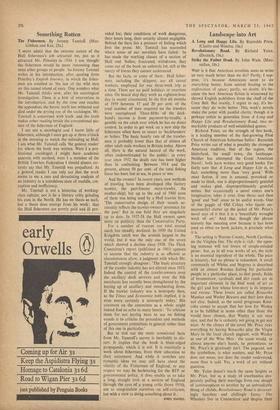Something Rotten
'I MUST admit that the extreme nature of the Hull fisherman's job attracted me, just as it attracted Mr. Priestley in 1934. I too thought the fishermen would be more interesting than most other groups of people. So Jeremy Tunstall writes in his introduction, after , quoting from Priestley's English Journey, in which the fisher- men are extolled as 'the last of the wild men on this tamed island of ours. One wonders what Mr. Tunstall thinks now, after his sociological investigation. There is a hint of reservation in the introduction, and by the time one reaches the appendices the heroic myth has withered and died under the prying eye of the sociologist. Mr. Tunstall is concerned with truth, and the truth makes sober reading beside the conventional pic- ture of the fishermen of England.
I am not a sociologist and I know little of fishermen, although 1 once got up at three o'clock in the morning to watch the unloading at Hull. I am what Mr. Tunstall calls 'the general reader' for whom the book was written. Were I a pro- fessional sociologist I might have academic quarrels with method; were 1 a member of the British Trawlers Federation I should almost cer- tainly say that Mr. Tunstall was prejudiced. As a general reader I can only say that the work seems to me a rare and devastating analysis of an industry in a scandalous state of muddle, cor- ruption and inefficiency.
Mr. Tunstall is not a historian of working- class culture; nor is he a literary critic grinding his axes in the North. He has no thesis as such, but a thesis does emerge from his work: that the Hull fishermen are poorly paid and ill pro- vided for; their conditions of work dangerous, their hours long, their security almost negligible. Behind the facts lies a pressure of feeling which fires the prose. Mr. Tunstall has succeeded where some of our novelists have failed: he has made the working classes of a section of Hull real. Sullen, frustrated, withdrawn, they cone out of the book an unheroic lot, still at the mercy of forces they cannot understand.
But the facts, or some of them : Hull fisher- men, including the skippers, are all casual workers, employed for one three-week trip at a time. There are no paid holidays or overtime rates. On board ship they work an eighteen-hour day (a recent concession). In the first six months of 1959 between 17 and 20 per cent. of the total number of men required on the trawlers were unemployed. Three-fifths of the deck- hand's income is from payment-by-results, a gamble on the catch over which he has no direct control. In order to get work on a new ship the fishermen often have to resort to 'backhanders' or bribes. The basic hourly rate of the trawler- men is probably lower than that of almost all other adult male workers in Britain today. Above all, there is the natural hazard of the work, often underestimated by the public: in every year since 1952 the death rate has been higher than in coalmining. Between 1914 and the present, almost 50 per cent. of the total fishing force has been lost at sea, in peace or war.
And the owners? In recent years, new methods of trawling have been developed (the factory trawler, the part-freezer stern-trawler, the mother-ship), but up to the end of 1960 none of them was being used by a Hull trawler firm. 'The conservative design of their vessels ac- curately reflects the trawler-owners' reverence for the past.' But in one field they are singularly up to date. In 1957-58 the Hull owners spent more on publicity than the Conservative Party.
For a number of reasons our total annual catch has steadily declined. In 1959 the United Kingdom catch was the seventh largest in the world, but it was the only one of the seven which showed a decline since 1938. The Fleck Committee's report (published in 1961) appears to assume that the industry is as efficient as circumstances allow, a judgment with which Mr. Tunstall strongly disagrees: 'The basic structure of the trawler industry has not altered since 1953. Indeed the control of the trawler-owners over the ancillary dock services and over the fish merchants has recently been strengthened by the buying up of ancillary- and merchanting firms. If the trawler industry was a monopoly then, as the Times and Economist both implied, it is even more certainly a monopoly today.' His comment on the committee as a whole might indeed find an echo in many hearts: 'To criticise them for not having been to sea on fishing vessels is to criticise the procedure and methods of government committees in general rather than of this one in particular.'
But to trot out the more sensational facts from Mr. Tunstall's survey is inevitably to dis- tort: It implies that the book is blunt-edged propaganda, which it is not. It is essentially a work about fishermen, from their education to their retirement. And while it scotches any romantic ideas we may still have about the vitality of the Fishermen of England, or any respect we may be harbouring for the BTF or governmental policy, it does enable us to take a long, straight look at a section of England through the eyes of a young critic (born 1934), not to congratulate ourselves on self-criticism, but with a view to doing something about it.
JOHN DANIEL


































 Previous page
Previous page